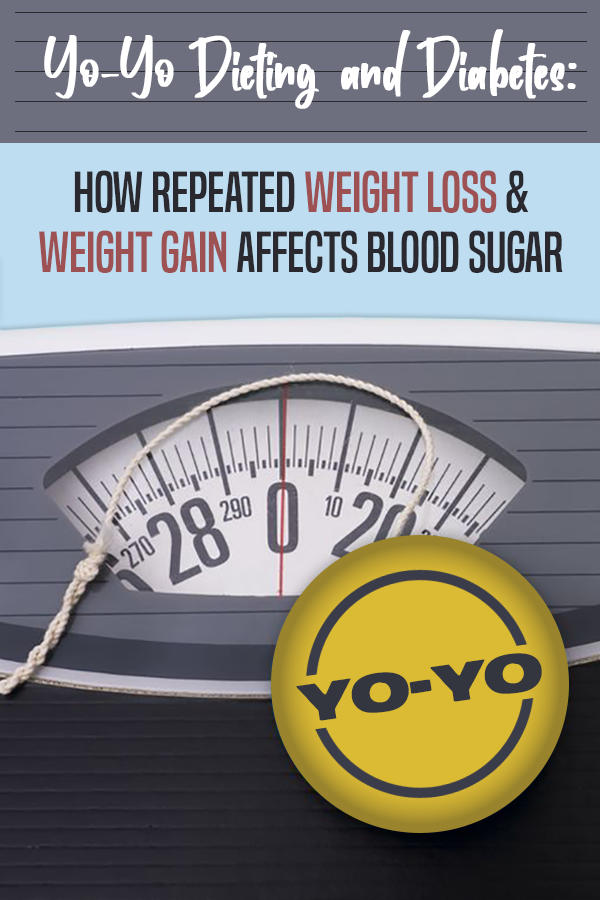
Yo-Yo Dieting and Diabetes After Bariatric Surgery
April 1, 2019Yo-Yo Dieting and Diabetes
Would it be better if you lost weight and regained it, or didn’t lose it at all? There is a toll on our bodies when we yo-yo diet.
Yo-Yo Dieting and Diabetes
Currently, almost 50 percent of women and 20 percent of men report wanting to lose weight per the National Health and Nutrition Examination Survey (NHANES). (Dennett, 2017). Unfortunately, roughly eight in ten of those who lose weight will regain that weight within a year.
Weight cycling means losing weight, regaining it, and repeating the cycle.
When this weight loss is the result of dieting, the process is often called “yo-yo dieting.” Yo-yo dieting could increase the risk of insulin resistance and diabetes. There are several proposed mechanisms by which weight cycling likely contributes to diabetes.
In an evolutionary model, if the food supply is limited, the response to a change in food availability is to gain a lot of weight when food is abundant. (McNamara, 2016) Recurring attempts to diet signal the body that food supply is low and can lead a dieter’s body to store more fat, than if the food was always abundant. Greater fat storage increases insulin resistance. When your cells are less able to use insulin effectively, blood glucose rises.
The act of weight loss, and specifically the loss of muscle with weight loss, triggers the body to fight back by increasing hunger, slowing metabolism and encouraging fat storage.
When the diet is over, the body regains fat first and fat overshooting, regaining more fat than was originally lost, and results in a slowed metabolism. This fat overshooting with each cycle of weight loss and regain can contribute to an overall increase in weight over time. That increased fat storage directly affects insulin resistance, causing an increased risk for diabetes with each cycle.
How Neurons Control Energy Balance
How neurons control energy balance isn’t fully understood, however, studies link weight cycling and adverse health outcomes like the development of metabolic syndrome associated with conditions such as type 2 diabetes, cardiovascular disease, and hypertension. (Shoefield, 2017)
While losing weight can help to reduce insulin resistance in the short term, yo-yo diet weight gain over time increases the risk of heart disease and diabetes.
The cycle of weight loss and regain seems to speed the development of diabetes.
More research is needed, but some limited evidence also suggests that low carbohydrate diets may also lead people to become less tolerant of glucose and develop diabetes. (Brueck, 2019)
Weight Loss and Regain After Bariatric Surgery
The yo-yo dieting cycle is broken because of three specific changes after bariatric surgery. Patients feel fuller with a limited amount of food, causing less calorie intake. Appetite is reduced due to smaller stomach volume, also contributing to less caloric intake. Lastly, the stomach produces less ghrelin (the hunger hormone).
Studies show bariatric surgery can induce a significant and sustainable remission and improvement of type 2 diabetes and other metabolic risk factors in severely obese patients.
Surgery within five years of a diagnosis of diabetes leads to long-term remission of diabetes in many patients (Brethauer, 2013). Gastric bypass results in significant sustained weight loss. It has also been shown at greater than 10 years, outcomes show improvement and remission of obesity-related co-morbidities like sleep apnea, hypertension and high cholesterol (Kothari, 2017)
Commit to Lifelong Changes
Obese individuals who undertake weight loss efforts should be ready to commit to lifelong changes in their behavioral patterns, diet, and physical activity. (Weight cycling. National Task Force on the Prevention and Treatment of Obesity., 1994).
If the diets you’ve been trying result in short-term loss followed by weight regain you may be placing yourself at greater long-term risk. Don’t feel shame about eating and dieting. Many people are struggling, instead, consider a better long-term option of bariatric surgery over repeated gain and loss to avoid the long-term health complications of diabetes.

 | ABOUT THE AUTHOR Patricia Mathis is a Nurse Practioner at Overlake Medical Clinics Metabolic and Bariatric Surgery in Bellevue, WA. Patricia's clinical interests include preventive care, patient education and metabolic and bariatric surgery. She believes in treating her patients as she would want for a loved one. She cares about each patient and each outcome. She will empower you with the knowledge to make educated healthcare decisions and support you in these choices. |



